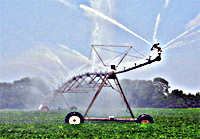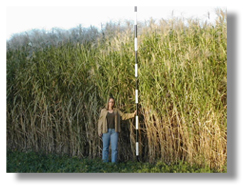Using Energy Wisely on the Farm and Ranch
There’s no avoiding this reality in farming: Energy is one of the more expensive components of raising crops and livestock. In fact in 2005 in Nebraska, agricultural expenditures rose 10 percent above 2004 costs according to the U.S. Department of Agriculture because of rising costs for fuel and fertilizer — which is petroleum-based. An earlier USDA study found that nearly half the cost of production was for spent for energy.
In this issue, the Quarterly profiles New Tools for Irrigators, Biodiesel Use, Wind Power, Ethanol from Switchgrass and Farm Energy Efficiency.
New Tool May Save Money for Nebraska Irrigators

A tool developed by University of Nebraska-Lincoln engineers may help irrigators evaluate the energy efficiency of their irrigation pumps. The engineers have developed an online spreadsheet that allows irrigators to calculate how much money they could save by making energy efficiency improvements to their irrigation systems.
Irrigators using the new tool can determine whether their pumps are using more energy than what Nebraska pumping-plant performance criteria suggest. This is done by entering data about energy use from irrigation records into the online spreadsheet. For example, the spreadsheet can calculate how much money could be saved by using a more efficient pump.
The spreadsheet tool is at http://lancaster.unl.edu/ag/crops/Long_Term_Pump.xls Persons who do not have internet access may contact their local library or Extension Office.
And to Finance That New Pump
After using the Tool and discovering how much money and energy you can really save on your irrigation operations, you may want to visit the web sites listed below for assistance in financing the improvements.
Using Biodiesel on the Farm
ATTRA’s National Sustainable Agriculture Information Service offers a 12-page publication, “Biodiesel Use, Handling, and Fuel Quality,” that highlights the use of biodiesel in diesel engines and addresses questions from  farmers and ranchers considering biodiesel in their operations.
farmers and ranchers considering biodiesel in their operations.
Biodiesel can be substituted for petroleum-based diesel fuel in virtually any standard unmodified diesel engine. However, biodiesel has chemical properties that require somewhat different use and handling. While most biodiesel users experience few if any problems, consumers can take precautions to avoid potential problems associated with poor quality fuel. Most biodiesel users pour it in the tank and experience few if any problems. Nonetheless, biodiesel has chemical properties that can cause difficulties. For example:
- Biodiesel’s detergent or solvent properties can clog your fuel filter as it cleans carbon deposits from your engine.
- Compared to petrodiesel, biodiesel has somewhat worse cold-flow properties.
- Biodiesel degrades rubber and certain other materials, making it incompatible with some fuel lines, rubber gaskets, and other engine parts.
The ATTRA project has served as the premier source of information about sustainable agriculture for U.S. farmers and other agriculturists for twenty years. ATTRA is funded by the U.S. Department of Agriculture's Rural Business-Cooperative Service. (ATTRA was formerly known as the "Appropriate Technology Transfer for Rural Areas" project.)
Farmers and Experts Talk Wind
Windustry’s Wind Farmers Network is a discussion forum for those interested in wind power to exchange ideas and information about wind power resources, economics, technology, and how to develop a wind project. In addition to being able to quiz experts on how to harvest wind, the site contains a number of forums including community wind issues and wind energy project sections in nine topical areas including:
- Wind resource measurement and analysis
- Construction, maintenance and operation
- Project permitting
- Interconnect and power purchase
- Ownership structures and project financing
- Easements and land leases
- USDA grant programs
- Small turbines
- Utility scale turbines

The on-farm cost of producing switchgrass for cellulosic ethanol averages about $60 per ton, according to a new study by a University of Nebraska-Lincoln agricultural economist and others.
 “Farm-Scale Production Cost of Switchgrass for Biomass” is the title of a new study that according to one of the authors is the most comprehensive study to date on assessing the economic costs of producing switchgrass biomass in commercial fields,” and gives a real-life look to farmers interested in growing and contracting switchgrass.
“Farm-Scale Production Cost of Switchgrass for Biomass” is the title of a new study that according to one of the authors is the most comprehensive study to date on assessing the economic costs of producing switchgrass biomass in commercial fields,” and gives a real-life look to farmers interested in growing and contracting switchgrass.The study, which contracted 10 farmers in Nebraska, North Dakota and South Dakota to commercially grow switchgrass for five years, starting in 2000 and 2001, gives a real-life look to farmers interested in growing and contracting switchgrass.
In the study, two farmers with previous experience growing switchgrass had the lowest production costs of $39 per ton. The five farmers with the lowest costs had production costs of less than $50 per ton, which should be achievable by other farmers as they gain production experience, a researcher said. The study does not include costs to transport the switchgrass to a biorefinery, nor the costs to process it in the biorefinery.
The fields used in the study were in Nebraska near Atkinson, Crofton, Lawrence and Douglas; in South Dakota near Highmore, Bristol, Huron and Ethan; and in North Dakota near Streeter and Munich. Land was marginal cropland that would have qualified for the Conservation Reserve Program. Farmers were paid for their work under contract with UNL and recorded all costs for producing switchgrass biomass start to finish, including machinery and labor, materials such as seed and fertilizer and land rent.

Farming with Clean Energy
Sustainable Agriculture Research and Education’s new 20-page publication, “Clean Energy Farming: Cutting Costs, Improving Efficiencies, Harnessing Renewables,” examines:
- Cutting costs and energy use
- Farming to save energy and curb pollution
- Generating energy on the farm
- Biofuels and looking at future feedstocks.